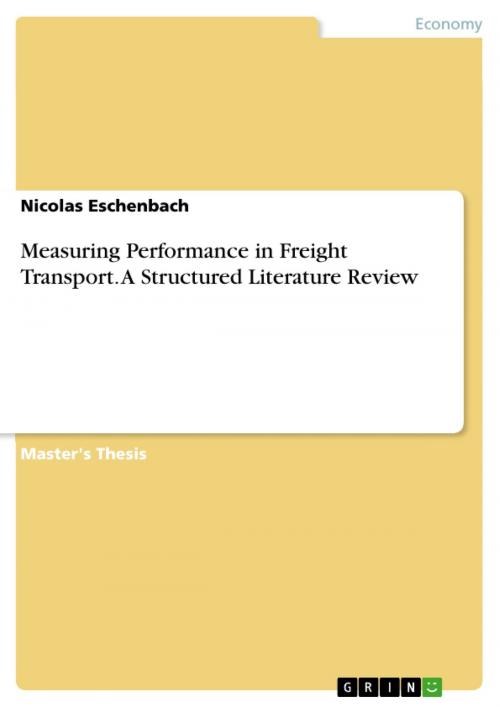Measuring Performance in Freight Transport. A Structured Literature Review
Business & Finance, Management & Leadership, Production & Operations Management| Author: | Nicolas Eschenbach | ISBN: | 9783668514041 |
| Publisher: | GRIN Verlag | Publication: | August 31, 2017 |
| Imprint: | GRIN Verlag | Language: | English |
| Author: | Nicolas Eschenbach |
| ISBN: | 9783668514041 |
| Publisher: | GRIN Verlag |
| Publication: | August 31, 2017 |
| Imprint: | GRIN Verlag |
| Language: | English |
Master's Thesis from the year 2016 in the subject Business economics - Supply, Production, Logistics, grade: 1, Vienna University of Economics and Business (Informationsverarbeitung & Prozessmanagement), language: English, abstract: Changing economic conditions and increasing competition forced many companies to extend their supply, production and distribution networks towards global approaches. This led to an increase in the importance of freight transport. In consequence, freight carriers are currently required to provide either cost or time efficient solutions to a wide range of industries. In order to select appropriate modes of transport or suitable carriers, enterprises must consider their performance beforehand. Moreover, carriers must be precisely aware of their own performance at any time. Consequently, performance measurement and the definition of suitable performance metrics plays an essential role in freight transport. In practice, companies have to face an extensive variety of indicators that can be used to assess performance in freight transport. Studies prove that there is lack of consistency in the usage of metrics. At the same time, researchers have to cope with wide range of available literature that discusses performance evaluation in freight transportation which is, though, often limited to specific areas of application. In this thesis a structured literature review (SLR) is carried out which has the objective to systematically find out how companies measure performance in intermodal, road, rail, air, and maritime freight transport. The conceptual findings of this SLR provide a list of 1742 metrics from the literature that can either be applied for one or several modes of freight transport. In addition, 47 different ways how KPIs can be classified are identified. The SLR proves that operational performance indicators mainly regard time, distance and available equipment. Strategic metrics focus on costs levels, the change of costs over time, ratios, fleet characteristics, environmental performance and market developments. The findings of this thesis are beneficial to practitioners because they provide guidance on how to appropriately select, classify and assess performance metrics. Furthermore, academics benefit from a structured overview on available knowledge across the literature.
Master's Thesis from the year 2016 in the subject Business economics - Supply, Production, Logistics, grade: 1, Vienna University of Economics and Business (Informationsverarbeitung & Prozessmanagement), language: English, abstract: Changing economic conditions and increasing competition forced many companies to extend their supply, production and distribution networks towards global approaches. This led to an increase in the importance of freight transport. In consequence, freight carriers are currently required to provide either cost or time efficient solutions to a wide range of industries. In order to select appropriate modes of transport or suitable carriers, enterprises must consider their performance beforehand. Moreover, carriers must be precisely aware of their own performance at any time. Consequently, performance measurement and the definition of suitable performance metrics plays an essential role in freight transport. In practice, companies have to face an extensive variety of indicators that can be used to assess performance in freight transport. Studies prove that there is lack of consistency in the usage of metrics. At the same time, researchers have to cope with wide range of available literature that discusses performance evaluation in freight transportation which is, though, often limited to specific areas of application. In this thesis a structured literature review (SLR) is carried out which has the objective to systematically find out how companies measure performance in intermodal, road, rail, air, and maritime freight transport. The conceptual findings of this SLR provide a list of 1742 metrics from the literature that can either be applied for one or several modes of freight transport. In addition, 47 different ways how KPIs can be classified are identified. The SLR proves that operational performance indicators mainly regard time, distance and available equipment. Strategic metrics focus on costs levels, the change of costs over time, ratios, fleet characteristics, environmental performance and market developments. The findings of this thesis are beneficial to practitioners because they provide guidance on how to appropriately select, classify and assess performance metrics. Furthermore, academics benefit from a structured overview on available knowledge across the literature.















